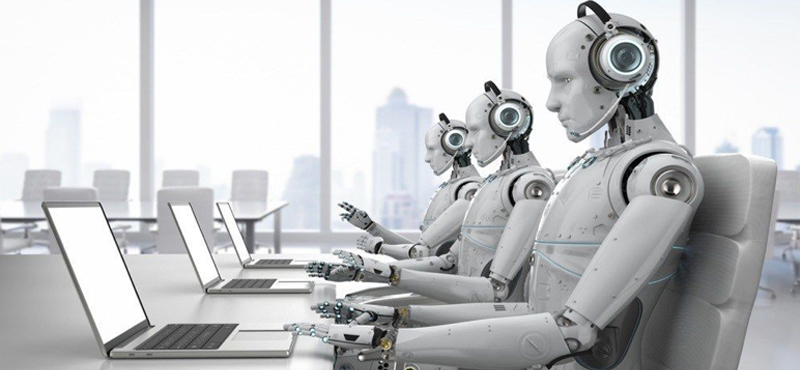An unknown fear is sweeping the job market worldwide, and this tide is called intelligent automation. Computers can think and act to achieve project goals, provide data insights to ownership and ultimately execute policies seamlessly across the organization. Robotics have invaded desktops and applications, no matter how complex the task at hand it. If you’re a business executive or associate, all of your fears and concerns can probably be summed up in one single question – what is the future of work going to look like?
‘The role of the future of human beings is to create, not produce.”
-Reinaldo Paponet
The verdict on the Future of Work is out, with the world’s Economic Forum’s 2018 report claiming that artificial intelligence and robotics will take over 75 million jobs worldwide by 2022.
Similarly, a PwC report also states that artificial intelligence will be on the top of the implementation agenda of around 20%, yes, that’s one fifth of the corporate world, by this year. These implementations will be rolled out across the enterprise this year, and the adoption rate is only set to accelerate going forward. Gartner states that AI will actually create more jobs than it will take away from the global economy.
BRACING FOR IT
Chances are, you have already encountered Artificial Intelligence in some form or the other, whether it’s an intelligent chatbot providing customer service or a recommendation at an ecommerce store that analyzed your purchase history to predict your choices. But of the 133 million jobs AI is set to create in the immediate and short term, the requirements will be massive and have some common characteristics in them. Cognizant’s 21 jobs for the 21st century show what the most lucrative job roles for the future will look like, and the information is staggering, given that these roles will come into play in less than a decade
Upon analysis, an interesting pattern emerges – the jobs of the future are not entirely AI driven. AI acts as a complement to augment speed and accuracy of operations of human workers.
But the most interesting research on the far reaching consequences of intelligent automation concerns Next Generation’s research which reveals some astonishing facts about the Fourth Industrial Revolution that we are in – almost half of today’s jobs will be automated by 2034, with 60% of all jobs today having components that can easily be automated. Automation can nearly double the growth of productivity to 1.6% globally. 375 million people will need to be updated with new technology skills that will include artificial intelligence by 2030 worldwide.
THE FUTURE OF JOBS
Although the statistics are abundant, there are some important patterns that emerge upon closer scrutiny:
- The job roles in themselves will require some basic understanding of Artificial Intelligence principles and dynamics to be fully able to leverage its’ utilities in the domain.
- More than 93% of enterprises worldwide are looking to implement AI in some form in the business operations in the near term. This translates to superlative opportunities for existing employees who can learn the basics and take the initiatives, carving out a high growth career trajectory for themselves.
- Talent Management will play a crucial role in the implementation of L&D modules for the uninitiated worker over the next three years This spells massive opportunities for employees with the will and the skill to be retrained for future job roles
- Newer technologies like Robotic Process Automation will see a convergence with Artificial Intelligence and ultimately result in smart and intelligent automation in the enterprise.
Overall, ironically, the net outlook for jobs remain positive, albeit in newer, emerging roles. Emerging professions will see a growth of 27% over traditional professions. Artificial Intelligence driven roles are certainly going to be in the limelight according to every single prediction quoted here from the world’s finest minds. So it is definitely the time to take the career leap into AI with the world’s first and only vendor neutral single-point specialization certification in Artificial Engineering! See you on the other side!
